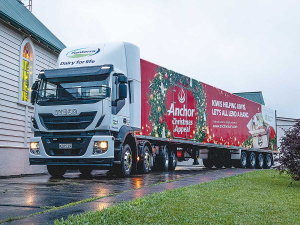Another Windfall for Fonterra Farmers, Unit Holders
Fonterra farmer shareholders and unit holders are in line for another payment in April.
 Anchor has donated $100,000 retail value in dairy products including milk, cream, custard, cheese and butter to kickstart the appeal.
Anchor has donated $100,000 retail value in dairy products including milk, cream, custard, cheese and butter to kickstart the appeal.
Fonterra is throwing its weight behind a donation appeal that aims to feed 15,000 New Zealanders this Christmas.
Anchor milk, part of Fonterra Brands, is partnering with the New Zealand Food Network, a national food charity that will fill and distribute Christmas food hampers to families in need.
Anchor has donated $100,000 in product including milk, cream, custard, cheese and butter to kickstart the appeal and is encouraging fellow Kiwis to support the New Zealand Food Network.
To help bring the appeal to life, Anchor has reimagined the classic Christmas poem ‘Twas the Night Before Christmas’, swapping the fairy-tale narrative for a story that aims to shed light on the issue of food poverty for New Zealanders.
The poem has been released as an online video with a new set of lyrics that chart the impact donations – big or small – can make this year.
Fonterra Brands New Zealand marketing director Mike Boness says the co-op is one of the founding corporate members of New Zealand Food Network. “Our values align with their endeavour to care for all New Zealanders,” he says.
“We hope our reimagination of ‘Twas the night before Christmas’ will encourage everyday Kiwis to support the appeal, as well as shine a spotlight on the issue of food poverty in our own backyard.”
Food hampers created for the appeal will include a Christmas spread for a family of four, including a ham, fresh vegetables and fruit, Weet-Bix, fresh milk, cheese, custard and cream, and some sweet treats.
The hampers will be delivered to charities across the country from December 21.
New Zealand Food Network’s fellow partners – including T&G Fresh, Sanitarium, and Griffins – are helping subisdise the cost of the hampers. This means that a $25 donation from the public will help feed a family of four this Christmas with a hamper valued at more than $110.
Donations made by New Zealanders to the appeal will go directly to NZ Food Network to help fund the food sourcing, creation, and distribution of its food hampers.
Since its establishment in May 2020, NZ Food Network has made a significant impact: in the first three months, it distributed 532,000kgs of food to its partnering food hubs which is equivalent to 1,520,700 meals delivered to people in need.
Boness says Anchor is committed to helping communities across the country prosper.
“As a quintessentially Kiwi brand, Anchor hopes to bring Kiwis together in the festive spirit of solidarity.”
NZ Food Network chief executive Gavin Findlay says the issue of food poverty in this country is a very real problem – and the onset of COVID-19 has only amplified the issue.
“The New Zealand Food Network was founded with the purpose of delivering nutritious food to charities across the country; however, we are facing an unprecedented challenge with Christmas just around the corner. We hope this appeal with Anchor will resonate with everyday New Zealanders, and together we can help thousands of our fellow Kiwis.”
The Meat Industry Association of New Zealand (MIA) today announced that Chief Executive Officer Sirma Karapeeva has resigned from the role.
The winners of the 2026 Hawke’s Bay/Wairarapa Dairy Industry Awards were announced at the annual awards dinner held at Copthorne Solway Park in Masterton on Thursday evening.
Environment Southland is welcoming this week’s decision by the Environmental Protection Authority (EPA) to approve the release of Blaptea elguetai, a leaf‑feeding beetle that will help control the highly invasive Chilean flame creeper.
This March, the potato industry is proudly celebrating International Women’s Day on 8 March alongside the International Year of the Woman Farmer, recognising the vital role women play across every part of the sector — from paddocks and packhouses to research, leadership, and innovation.
Fruit trader Seeka posted a record profit and returns to shareholders in 2025.
Recent weather events in the Bay of Plenty, Gisborne/Tairawhiti, and Canterbury have been declared a medium-scale adverse event.
OPINION: Staying with politics, with less than nine months to go before the general elections, there’s confusion in the Labour…
OPINION: Winston Peters' tirade against the free trade deal stitched with India may not be all political posturing by the…